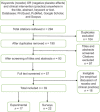Negative expectations (nocebo phenomenon) in clinical interventions: A scoping review
- PMID: 38726093
- PMCID: PMC11081451
- DOI: 10.4103/jehp.jehp_269_23
Negative expectations (nocebo phenomenon) in clinical interventions: A scoping review
Abstract
Unpredictable, undesirable, and confusing reactions in the face of psychological or medical interventions make the clinical presentation more complicated and may represent clinically unexplained symptoms and also disturbed the doctor-patients relationship and decrease patients' benefits of treatment. It seems that negative expectations from the treatment (nocebo phenomenon) can explain such reactions. The aim of the current study is a scoping review and investigate different aspects of the nocebo phenomenon (negative expectations) in clinical interventions. This paper follows a scoping review of the existence, importance, and multidimensions of the nocebo phenomenon in medical and psychological interventions. Data sources include literature databases (ProQuest, PubMed, Google Scholar, and Scopus) reviewed from inception dates to 2023, and the terms negative expectations, nocebo effect, placebo effect, negative placebo, and clinical interventions were searched. The review of the available articles showed that negative expectations play an important role in the process and effectiveness of clinical interventions. Negative expectations (here named nocebo effect) can significantly interfere with rapport and treatment processes. Some underlying components of the nocebo effect include negative expectancies, conditioning, social learning, memory, cognitive distortions, meaning, motivation, somatic focus, negative reinforcements, personality, anxiety, and neurophysiological factors such as CCK, dopamine, and cortisol are proposed for development and presence of nocebo phenomenon in clinical practice. Negative expectations with its biopsychosocial aspects play an important and amazing role in disorganizing medical and psychological interventions. Using appropriate methods to reduce nocebo effects in therapeutic interventions may increase treatment compliance and adherence and increase the effectiveness of interventions.
Keywords: Clinical interventions; negative expectation; nocebo effect; placebo effect.
Copyright: © 2024 Journal of Education and Health Promotion.
Conflict of interest statement
There are no conflicts of interest.
Similar articles
-
Nocebo and the potential harm of 'high risk' labelling: a scoping review.J Adv Nurs. 2015 Jul;71(7):1518-29. doi: 10.1111/jan.12637. Epub 2015 Feb 20. J Adv Nurs. 2015. PMID: 25702534
-
The nocebo effect: a clinicians guide.Aust N Z J Psychiatry. 2013 Jul;47(7):617-23. doi: 10.1177/0004867412464717. Epub 2012 Oct 23. Aust N Z J Psychiatry. 2013. PMID: 23093053 Review.
-
Placebo and Nocebo Effects: The Advantage of Measuring Expectations and Psychological Factors.Front Psychol. 2017 Mar 6;8:308. doi: 10.3389/fpsyg.2017.00308. eCollection 2017. Front Psychol. 2017. PMID: 28321201 Free PMC article.
-
Nocebo phenomena in medicine: their relevance in everyday clinical practice.Dtsch Arztebl Int. 2012 Jun;109(26):459-65. doi: 10.3238/arztebl.2012.0459. Epub 2012 Jun 29. Dtsch Arztebl Int. 2012. PMID: 22833756 Free PMC article. Review.
-
What is the nocebo effect and does it apply to dentistry?-A narrative review.J Oral Rehabil. 2022 May;49(5):586-591. doi: 10.1111/joor.13306. Epub 2022 Mar 9. J Oral Rehabil. 2022. PMID: 35043415 Free PMC article. Review.
Cited by
-
Exploring the Factors Related to Medication Adherence in Patients with Rheumatoid Arthritis Based on Social Cognitive Theory: A Path Analysis.Patient Prefer Adherence. 2025 Aug 20;19:2565-2575. doi: 10.2147/PPA.S529952. eCollection 2025. Patient Prefer Adherence. 2025. PMID: 40860603 Free PMC article.
References
-
- Bingel U, Wanigasekera V, Wiech K, Ni Mhuircheartaigh R, Lee MC, Ploner M, et al. The effect of treatment expectation on drug efficacy: Imaging the analgesic benefit of the opioid remifentanil. Sci Transl Med. 2011;3:70ra14. doi: 10.1126/scitranslmed.3001244. - PubMed
-
- Benedetti F, Colloca L, Torre E, Lanotte M, Melcarne A, Pesare M, et al. Placebo-responsive Parkinson patients show decreased activity in single neurons of subthalamic nucleus. Nat Neurosci. 2004;7:587–8. - PubMed
-
- Rief W, Nestoriuc Y, von Lilienfeld-Toal A, Dogan I, Schreiber F, Hofmann SG, et al. Differences in adverse effect reporting in placebo groups in SSRI and tricyclic antidepressant trials: A systematic review and meta-analysis. Drug Saf. 2009;32:1041–56. - PubMed
-
- Cocco G. Erectile dysfunction after therapy with metoprolol: The Hawthorne effect. Cardiology. 2009;112:174–7. - PubMed
Publication types
LinkOut - more resources
Full Text Sources


